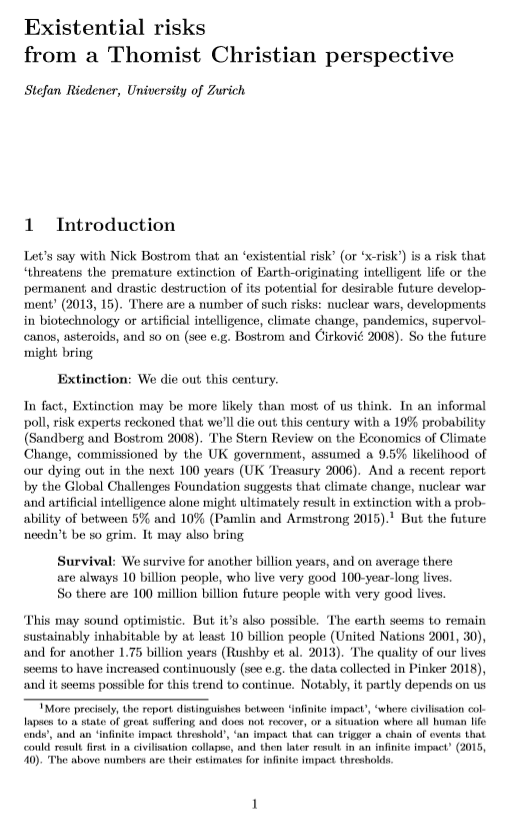Existential risks from a Thomist Christian perspective
Stefan Riedener (University of Zurich)
GPI Working Paper No. 1-2021, published in Effective Altrusim and Religion
Let’s say with Nick Bostrom that an ‘existential risk’ (or ‘x-risk’) is a risk that ‘threatens the premature extinction of Earth-originating intelligent life or the permanent and drastic destruction of its potential for desirable future development’ (2013, 15). There are a number of such risks: nuclear wars, developments in biotechnology or artificial intelligence, climate change, pandemics, supervolcanos, asteroids, and so on (see e.g. Bostrom and Ćirković 2008). [...]
Other working papers
Shutdownable Agents through POST-Agency – Elliott Thornley (Global Priorities Institute, University of Oxford)
Many fear that future artificial agents will resist shutdown. I present an idea – the POST-Agents Proposal – for ensuring that doesn’t happen. I propose that we train agents to satisfy Preferences Only Between Same-Length Trajectories (POST). I then prove that POST – together with other conditions – implies Neutrality+: the agent maximizes expected utility, ignoring the probability distribution over trajectory-lengths. I argue that Neutrality+ keeps agents shutdownable and allows them to be useful.
Non-additive axiologies in large worlds – Christian Tarsney and Teruji Thomas (Global Priorities Institute, Oxford University)
Is the overall value of a world just the sum of values contributed by each value-bearing entity in that world? Additively separable axiologies (like total utilitarianism, prioritarianism, and critical level views) say ‘yes’, but non-additive axiologies (like average utilitarianism, rank-discounted utilitarianism, and variable value views) say ‘no’…
Population ethics with thresholds – Walter Bossert (University of Montreal), Susumu Cato (University of Tokyo) and Kohei Kamaga (Sophia University)
We propose a new class of social quasi-orderings in a variable-population setting. In order to declare one utility distribution at least as good as another, the critical-level utilitarian value of the former must reach or surpass the value of the latter. For each possible absolute value of the difference between the population sizes of two distributions to be compared, we specify a non-negative threshold level and a threshold inequality. This inequality indicates whether the corresponding threshold level must be reached or surpassed in…

